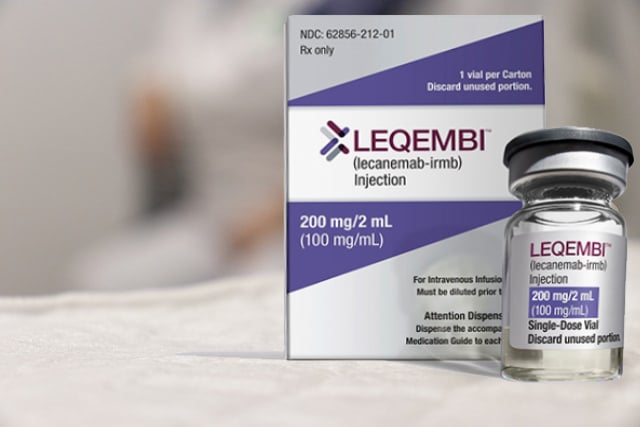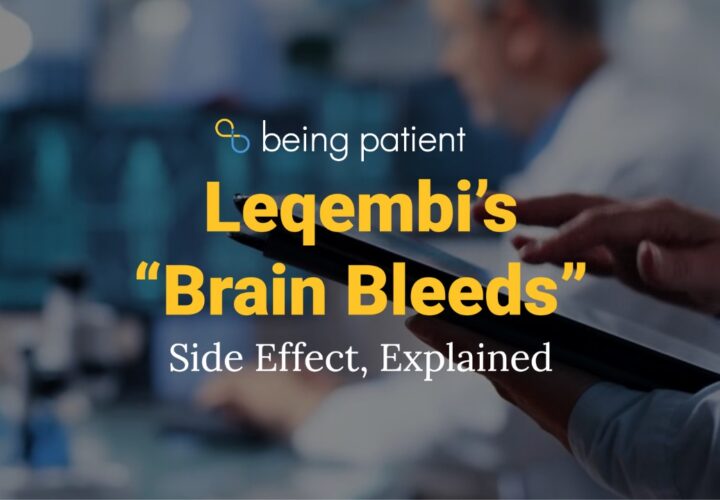Some private insurers are refusing to cover Alzheimer's drug Leqembi. One doctor explains why he thinks these wrongful coverage denials occur.
Medicare covers the cost of the anti-amyloid Alzheimer’s drug Leqembi, but many people with Alzheimer’s are under the age of 65 and don’t yet qualify for Medicare. This isn’t a small number of patients: Drugmaker Eisai estimates about 24 percent of people who might be eligible for Leqembi aren’t covered. What’s more, many private insurers won’t cover the cost of Leqembi at all.
Decisions made by private insurers to deny coverage can be overturned. In 2021, Americans submitted more than 290 million health insurance claims. Around 43 million of these were denied by insurers, but only one in 500 of these claims — 90,684 in total — were appealed by patients and their healthcare providers, and the decision was reversed by the insurers 40 percent of the time.
The appeals go through an internal process commonly called a peer-to-peer review. During the peer-to-peer review, your doctor speaks with a doctor at the insurance company, making the case for covering a drug or treatment. When the internal appeal fails, doctors and their patients can ask for an external review, which involves sending the insurance claim to a third-party organization to make the final decision.
Dr. David Weisman, of Abington Neurology Associates, is fighting for coverage for one of his patients, a 61-year-old woman in the early stages of Alzheimer’s, who he believes is being wrongfully denied coverage. The process has taken more than nine months, according to documents provided by Weisman.
Beverly Rossino, an administrator who files claims on behalf of patients at Abington Neurological Associates, told Being Patient that this is much longer than usual. Ten to 14 days is a normal turnaround time.”
The woman was prescribed Leqembi in June 2023, but the insurer, Blue Cross Blue Shield, initially denied the claim in July. The insurer did not offer Weisman a peer-to-peer review. A spokesperson for the insurer declined to explain the reasoning behind that decision to Being Patient.
Then, Weisman submitted an external appeal to a third-party organization called AllMed for final adjudication. However, AllMed did not receive the case details from Blue Cross Blue Shield until January, 2024. It took nine months for Weisman and his patient to hear back, and in March, 2024, the appeal was rejected. (AllMed did not respond to requests for comment.)
“We do not comment on details of specific claims or members … and actual response times differ depending on the type of claim,” Blue Cross Blue Shield spokesperson Leilyn Perri wrote over email.
In the final written decision, the third-party reviewer, a doctor whose name was redacted, wrote that the drug was “considered experimental/investigation because it had NOT been proven to be safe and effective.” Weisman told Being Patient that he’d never seen an anonymous denial before. Beverly Rossino, the administrator at Abington, agreed, adding that it’s the first time in her 28-year career that she’s seen an anonymous insurance denial.
The conclusion drawn by the third-part reviewer that the drug has not been proved to be safe and effective contradicts statements from the FDA, which approved the drug in July, 2023. The then acting director of the FDA’s neuroscience office stated that the Phase 3 trial of Leqembi “verified that it is a safe and effective treatment for patients with Alzheimer’s disease.”
This isn’t out of the norm for insurance companies. Adrian Sipes, a spokesperson for the Pennsylvania Insurance Department, the state’s regulator, told Being Patient that insurance companies can have a different internal definition of what they consider investigational or experimental.
“I do not believe that a physician boarded in neurology could be capable of the disordered thinking displayed here,” Weisman wrote in a letter to AllMed. “Without being able to attribute this, we cannot put a name to the document, we cannot know that this is a physician, and thus cannot accept the document.”
There is no publicly available information on how common it is for a doctor’s name to be redacted from an external review decision.
In the decision, the reviewer quoted two studies and one commentary on Leqembi, concluding that the drug was experimental for patients in the early stages of Alzheimer’s. The first was a Phase 3 trial, which was the basis for approving Leqembi. The second was a commentary on the clinical trial, which stated that the drug “showed a small clinical benefit” but that there were questions over whether patients would notice the benefit and about the drug’s safety and accessibility.
The reviewer provided a quote from a third study, which is irrelevant to the patient’s situation. The study noted that Leqembi “showed significant positive effects on cognition, function, behavior, and overall change” but that it wasn’t tested in advanced-stage Alzheimer’s patients. The 61-year-old woman applying for coverage is in the early stages of Alzheimer’s.
Tufts Medical Center maintains a database of insurance coverage decisions in the U.S. — two percent of the time, insurers do not cover drugs that are approved by the FDA. These rejections are more likely when there’s disagreement, as in the case of Leqembi, over how well a drug works.
In line with national data, in Pennsylvania, claims rejected because the underlying treatment is considered investigational are exceedingly rare, accounting for 1,959 of the 133,459 rejections in 2022. In 2022, only 70 of these denied claims were sent for an external appeal and 25 were overturned.
So what can people living with Alzheimer’s do if they disagree with an insurance decision or denial? While Medicaid allows members to appeal within 60 days of a decision, Sipes said that the only remedy for people with private health insurance involves consulting with a private counsel.
In some cases, they need to file suit against the insurance companies.
When Blue Cross and Blue Shield of Louisiana denied Robert “Skeeter” Salim — an experienced lawyer — coverage for proton therapy to treat his throat cancer, he sued. The insurer and the external review company had relied on faulty guidance to deny his insurance claim and after four years in court, the insurer was forced to pay for his treatment.
People living with early-onset Alzheimer’s have more trouble getting insurance coverage for Leqembi. In Rossino’s experience filing insurance claims on behalf of patients, “the younger they are, the harder it is” for patients to receive coverage.
People with the early-onset form of the disease rely on the decisions of private insurance companies, which oftentimes their employers choose. Weisman said that people with early-onset Alzheimer’s also progress faster — which means that getting timely decisions from insurers is important in order to figure out what treatments and care they are able to receive.
Those who can’t get coverage through their insurer will often receive assistance from Leqembi’s drugmaker, which can cover part of the cost or the entire cost of the drug in certain cases. While this assistance is available, Weisman noted that those living with Alzheimer’s will often want to try to go through their insurance company first because they’re concerned the drug company might renege on its promise of providing the discount.
This confusing process, say Weisman and Rossini, causes a lot of stress and frustration.
States like Pennsylvania are implementing fixes to streamline the process for patients. As of the last six months, the Pennsylvania Insurance Department has been in charge of external appeals for many private insurers. The process takes 60 days from start to finish, with an accelerated assessment to meet more immediate healthcare needs.




Have you or are you looking at amyloidsis and how it is affecting the brain. I have amyloidsis and it has burned my bari receptors affecting my blood pressure and is now affecting my memory and speech. I suffer from forgetfulness no remember days dates conversations I have also begun to not be able to say certain words. I also suffer from depression loss of balance headaches and we’ve dizziness.
We are having problems with the 3 months bills from care 1st insurance deniels not paying for Lequimbi for my husband. Thank God he was approved for medicare and they pay for most of it. Insurance companies are think they are gods and they should treat sick people better.
Hi Debra, we’re sorry to hear about the struggles you and your family are experiencing with your medical bills. Some private insurers are refusing to cover Leqembi. Wishing you and your husband continued health and success as you navigate this journey.
Also: Lequimbi works !! My husband is living proof ! All insurance companies should cover this drug with no questions asked.
Lequimbi works !! I’m living proof ! All insurance companies should cover this drug with no questions asked.
Hi James, thank you for being part of our community. We’re so glad to hear Leqembi is helping you. Stories like yours are an important part of the conversation! Take care.